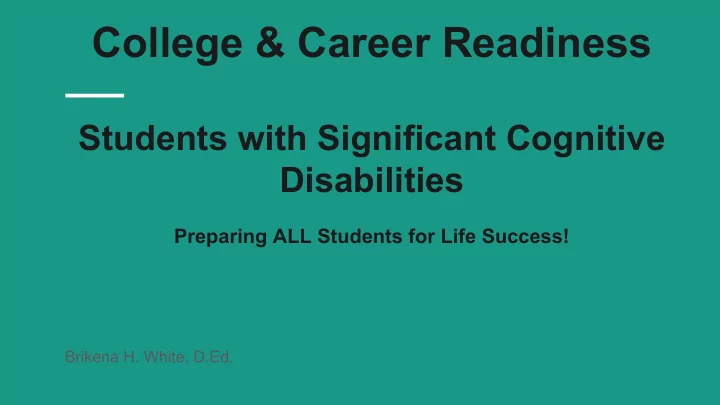

College & Career Readiness Students with Significant Cognitive Disabilities Preparing ALL Students for Life Success! Brikena H. White, D.Ed.
Desired Outcomes 1. What does it mean to be college and career ready? 2. How can we prepare our students to be college and career ready?
My Journey! ● Born and raised and lived in Albania during Communist Era Education: 1976-1996 ● Eligibility-based admission model ● One cut score entrance exam ● Students were sorted “college bound” & “non-college bound” ● Students with special needs were considered less than
Reality Nationwide ● 40% of adults ages 25-64 hold either a 2-year or a 4-year college degrees (Lumina Foundation, 2016) ● Students with special needs are half as likely as their peers to take college entrance tests such as the SAT (Lipscomb, 2017). ● ⅕ of employers indicated that applicants lack hard skills, or task related qualifications (NCES, 2016). ● By 2020, 70% of Hawaii’s jobs will require some college education.
Students with Severe Cognitive Disabilities ● Students with special needs are less likely to have paid work experience, despite evidence that working during high school relates to whether they can find jobs afterward (Lipscomb, 2017) ● A large number of adults with severe disabilities live with their parents after high school with limited friends and a few employment opportunities (Ross, Marcell, Williams & Carlson, 2013). ● Many work experiences involve low wages, few hours and segregated settings (Simon & Newbert, 2013).
What does it mean to be College and Career Ready? “A student who is ready for college and career can qualify for and succeed in entry level, credit bearing college courses leading to a bachelor’s or a certificate or career pathway-oriented training programs without the need for remedial or developmental coursework” (Conley, 2012).
Standards for Success and the Four Keys to College and Career Readiness (Conley, 2007)
In-School Predictors of Postsecondary Success ● Academic Foundations ● Communicative Competence ● Inclusion in general education environment ● Self-advocacy/determination skills-Student involvement in the IEP process ● Self-care/independent living and social skills ● Transition Program/Student support ● Address Physical and Health Care Needs ● Paid/non paid work study or community employment based learning experiences ● Vocational Skills Instruction ● Parental Engagement (family expectations) ● Dual Enrollment Transition Programs ● Interagency Planning
Benefits of Academic Foundations: Why Reading, Writing & Math? ● Communicate with family friends, medical personnel, etc … ● Travel in the community ● Understand books, movies, TV ● Use transportation ● Tell time ● Manage money ● Access curriculum & instruction
Communicative Competence The silence of speechlessness is never golden. We all need to communicate and connect with each other – not just in one way, but in as many ways as possible. It is a basic human need, a basic human right. And more than this, it is a basic human power … (Williams, B. (2000).
Inclusion in General Education Setting ● Peer Tutors ● Collaboration ● Instructional Strategies: UDL (Universal Design for Learning) ● Scheduling ● School Climate: ALL Means ALL!
Group Discussion The group summarized the most important components of how we best can prepare students with severe cognitive disabilities for College and Career Readiness. ● Start Early ● Invite Student to IEP meeting ● Engage the whole school staff in the inclusion process ● Engage parents (discussed how to help parents developing high expectations) ● Student Centered Planning ● Agencies involved must be in communication and aligned with each other ● Parent trainings on transition planning and Alternate Assessment Process ● Provide self-advocacy, social skills, self-determination training throughout the grades ● Base IPE planning on the IEP postsecondary goals ● Administrator trainings on IEP transition planning and Alternate Assessment Process
References ACT (2011). ACT College Readiness Standards. Retrieved from http://www.act.org/standar/ Conley, D. T. (2014). New Conceptions of College and Career Ready: A Profile Approach to Admission. Journal of College Admission , (223). Conley, D. T. (2012). A Complete Definition of College and Career Readiness. Educational Policy Improvement Center (NJ1) . Conley, D. T., & McGaughy, C. L. (2012). College and Career Readiness: Same or Different. Educational Leadership , 69 (7), 28-34. Gaertner, M. N., Kim, J., DesJardins, S. L., & McClarty, K. L. (2014). Preparing students for college and careers: The causal role of algebra II. Research in Higher Education , 55 (2), 143-165. Kearns, J., Kleinert, H., Harrison, B., Sheppard-Jones, K., Hall, M., & Jones, M. (2011). What does ‘college and career ready’mean for students with significant cognitive disabilities. Lexington, KY: National Alternate Assessment Center . Lipscomb, Stephen (2017), Closing the Gap: Improving Outcomes for Students with Disabilities. Retrieved from https://www.mathematica-mpr.com/commentary/closing-the-gap-improving-outcomes-for-students-with-disabilities Meyer, A., Rose, D. H., & Gordon, D. T. (2014). Universal design for learning: Theory and practice . CAST Professional Publishing. Newman, L., Wagner, M., Knokey, A. M., Marder, C., Nagle, K., Shaver, D., & Wei, X. (2011). The Post-High School Outcomes of Young Adults with Disabilities up to 8 Years after High School: A Report from the National Longitudinal Transition Study-2 (NLTS2). NCSER 2011-3005. National Center for Special Education Research . NCSC (2014), College and Career Readiness for Students with Significant Cognitive Disabilities. Retrieved from http://ncscpartners.org/Media/Default/PDFs/ Resources/Parents/NCSC-College-and-Career-Readiness-summary-9-10-13.pdf Wehmeyer, M. L., & Shogren, K. A. (Eds.). (2016). Handbook of research-based practices for educating students with intellectual disability . Taylor & Francis. Williams, B. (2000). More than an exception to the rule. In M. Fried-Oken & H. Bersani (Eds.), Speaking up and spelling it out (pp. 245–254). Baltimore, MD: Paul H. Brookes.
Recommend
More recommend